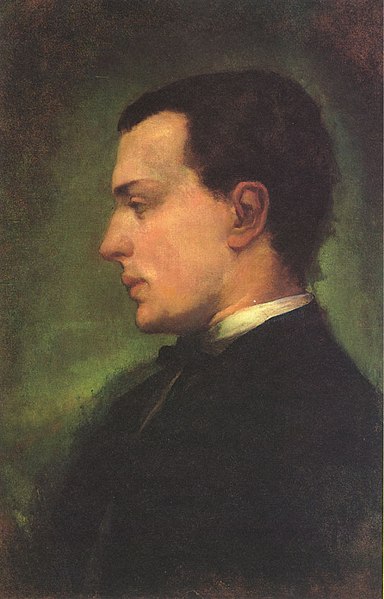
Portrait by John LaFarge. oil on canvas. (1862)
La Farge painted this portrait of James in Newport, Rhode Island, when Henry was still in his teens. His relationship with the older artist set the tone for James’s early novel Roderick Hudson. La Farge had come to study with William Morris Hunt, with whom William James also studied. La Farge had lived in France and knew the work of writers such as Sainte-Beuve, Baudelaire, and Flaubert. James wrote: “He revealed to us Balzac. . . . To reread, even after long years, the introductory pages of Eugenie Grandet . . . is to see my initiator’s youthful face, so irregular but so re ned, look out at me between the lines as through prison bars.”
from Turn of the Screw (1898)
He was soon at some distance from me, still breathing hard and again with the air, though now without anger for it, of being confined against his will. Once more, as he had done before, he looked up at the dim day as if, of what had hitherto sustained him, nothing was left but an unspeakable anxiety. “Oh, yes,” he nevertheless replied—“they must have repeated them. To those they liked,” he added.
There was, somehow, less of it than I had expected; but I turned it over. “And these things came round—?”
“To the masters? Oh, yes!” he answered very simply. “But I didn’t know they’d tell.”
“The masters? They didn’t—they’ve never told. That’s why I ask you.”
He turned to me again his little beautiful fevered face. “Yes, it was too bad.”
“Too bad?”
“What I suppose I sometimes said. To write home.”
I can’t name the exquisite pathos of the contradiction given to such a speech by such a speaker; I only know that the next instant I heard myself throw off with homely force: “Stuff and nonsense!” But the next after that I must have sounded stern enough. “What were these things?”
My sternness was all for his judge, his executioner; yet it made him avert himself again, and that movement made me, with a single bound and an irrepressible cry, spring straight upon him. For there again, against the glass, as if to blight his confession and stay his answer, was the hideous author of our woe—the white face of damnation. I felt a sick swim at the drop of my victory and all the return of my battle, so that the wildness of my veritable leap only served as a great betrayal. I saw him, from the midst of my act, meet it with a divination, and on the perception that even now he only guessed, and that the window was still to his own eyes free, I let the impulse flame up to convert the climax of his dismay into the very proof of his liberation. “No more, no more, no more!” I shrieked, as I tried to press him against me, to my visitant.
“Is she here?” Miles panted as he caught with his sealed eyes the direction of my words. Then as his strange “she” staggered me and, with a gasp, I echoed it, “Miss Jessel, Miss Jessel!” he with a sudden fury gave me back.
I seized, stupefied, his supposition—some sequel to what we had done to Flora, but this made me only want to show him that it was better still than that. “It’s not Miss Jessel! But it’s at the window—straight before us. It’s there—the coward horror, there for the last time!”
At this, after a second in which his head made the movement of a baffled dog’s on a scent and then gave a frantic little shake for air and light, he was at me in a white rage, bewildered, glaring vainly over the place and missing wholly, though it now, to my sense, filled the room like the taste of poison, the wide, overwhelming presence. “It’s he?”
I was so determined to have all my proof that I flashed into ice to challenge him. “Whom do you mean by ‘he’?”
“Peter Quint—you devil!” His face gave again, round the room, its convulsed supplication. “Where?”
They are in my ears still, his supreme surrender of the name and his tribute to my devotion. “What does he matter now, my own?—what will heever matter? I have you,” I launched at the beast, “but he has lost you forever!” Then, for the demonstration of my work, “There, there!” I said to Miles.
But he had already jerked straight round, stared, glared again, and seen but the quiet day. With the stroke of the loss I was so proud of he uttered the cry of a creature hurled over an abyss, and the grasp with which I recovered him might have been that of catching him in his fall. I caught him, yes, I held him—it may be imagined with what a passion; but at the end of a minute I began to feel what it truly was that I held. We were alone with the quiet day, and his little heart, dispossessed, had stopped.